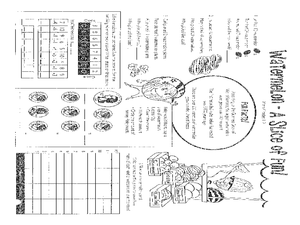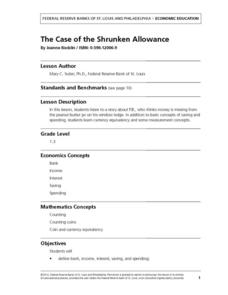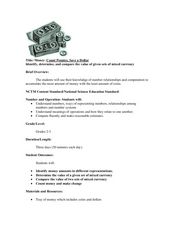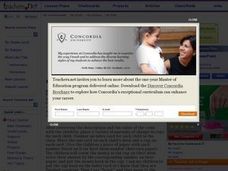Curated OER
Watermelon - A Slice of Fun
In this multiple math skills about watermelons worksheet, young scholars solve most and least word problems, subtract to solve a cod and find the answer to a question, count coins, and graph types of watermelons. Students solve 28...
Curated OER
Ch-Ch-Ching Cafe: Play Restaurant Make Change
Fourth graders make change by participating in a role-play restaurant activity. In this making change lesson, 4th graders use their math skills to compare prices and compute bills in a role play restaurant activity.
Curated OER
Money in Action
Learners become familiar with the various coins in our money system as well as amount of each coin. They help develop their ability to count change and find different ways to show equal amounts.
Curated OER
Money Counts
Fourth graders identify bills and coins to $20 bills and make equivalencies. They organize bills and coins in groups from greatest to least and least to greatest. Students count out change.
Curated OER
We're In The Money
Learn about the history of money, as well as counterfeiting, budget vocabulary, and money management. Much of the lesson requires a Nova video; however, it also includes numerous worksheets that may be useful even without the video....
Curated OER
Saving Money
After listening to the wonderful book, A Chair for my Mother, young mathematicians engage in an awesome lesson about coins and the value of saving money. The lesson is done in a classic style - everything is beautifully organized, and...
Curated OER
Managing My Money
Second graders use The Berenstain Bears' to learn about money management. In this money management lesson, 2nd graders read The Berenstain Bears' Dollars and Sense book and complete the 'Rainy Day' worksheet. Students then discuss the...
Curated OER
Right on the Money
Students are introduced to coins and bills in American currency. After watching a video, they practice making the same amount of money out of different combinations of coins and bills. Using the internet, they discover how much each...
Curated OER
Money Talks Canadian Money
Students use newspapers, games and journal writing activities to examine the importance of money and the role it plays in daily life. They complete several math problems, fill out worksheets and practice changing varying amounts.
Curated OER
Counting Coins
Students identify the different types of coins. They practice buying objects in the classroom with their coins. They must use different combinations of coins in all situations.
Curated OER
Money Math
Students explore a story about a room decoration activity to learn about measurements and area. In this measurement lesson, students listen to a story about a boy who is redecorating his bedroom. Students discuss the story and work in...
Curated OER
It's On Sale
First graders read the book The Great Pet Sale to learn about economics and advertisements. In this economics lesson plan, 1st graders read the book The Great Pet Sale and define related vocabulary words. Students compare prices to find...
Curated OER
Characteristics and Functions of Money
Fourth graders discuss the function and characteristics of money. In this financial education lesson plan, 4th graders read the book The Go-Around Dollar by Johnston Adams. This book sparks a conversation on how money is used and the...
Curated OER
Money Versus Trade
Students discover the importance of exchanging money in a market. For this economics lesson, students discover natural resources and how one can barter with those resources. In addition, students complete worksheets and discover the...
Federal Reserve Bank
The Case of the Shrunken Allowance
An allowance is an important thing! Make sure your kids know how to save and spend their own money. Using the book The Case of the Shrunken Allowance as a starting point, this plan covers income, spending and saving, counting, and more.
Curated OER
Alexander Used to Be Rich
Reading Alexander, Who Used to Be Rich Last Sunday, launches this lesson appropriate for children who recognize coins and have been introduced to coin values. Using addition and subtraction skills, the class tracks Alexander’s spending...
Curated OER
Buckets of Bucks for World Hunger
Learners participate in a nonprofit organization activity for hunger outreach problems. In this service project lesson plan, students practice counting coins, complete a service project for a hunger outreach, discuss nutrition and...
Curated OER
Money: Count Pennies, Save a Dollar
Students determine how to make the largest sum of money using the least amount of coins. In this mixed currency lesson, students listen to a reading of If You Made a Million by David M. Schwartz before participating in money counting...
Curated OER
Scoot for Money
Students rotate through a group of centers counting the coins that are in a cup placed at each spot. After completing the entire circuit, papers are graded as a whole class and each student gets to spend the money in their cup at a class...
Curated OER
Savings Accounts and Interest
First graders study money, banks, and getting interest on money. In this consumer math lesson, 1st graders listen to Stan and Jan Berenstain's, Berenstain Bears' Trouble With Money. They use the concepts in the book to discuss...
Curated OER
Buggin' Out (Identifying and Adding Amounts of Money)
Students explore consumer math by participating in estimate exercises. In this currency lesson, students identify and define each piece of U.S. currency and their value to the monetary system. Students complete several money worksheets...
Curated OER
Show Me the Money
Students review the terms in the "Money Vocabulary Word Bank." They make a wallet or purse to keep their money in. Students learn the song "Show Me the Money." They participate in five centers: 1) Head or Tails Tally, 2) Piggy Bank...
Curated OER
Musical Money
Third graders participate in the game Musical Money. The game Musical Money is fashioned after the game Musical Chairs, but students count money using a time limit.
Visa
What is Money?
Students identify the names of coins and grasp their relative values in terms of purchasing power. They engage in activities and games that help them acquire this knowledge.

























